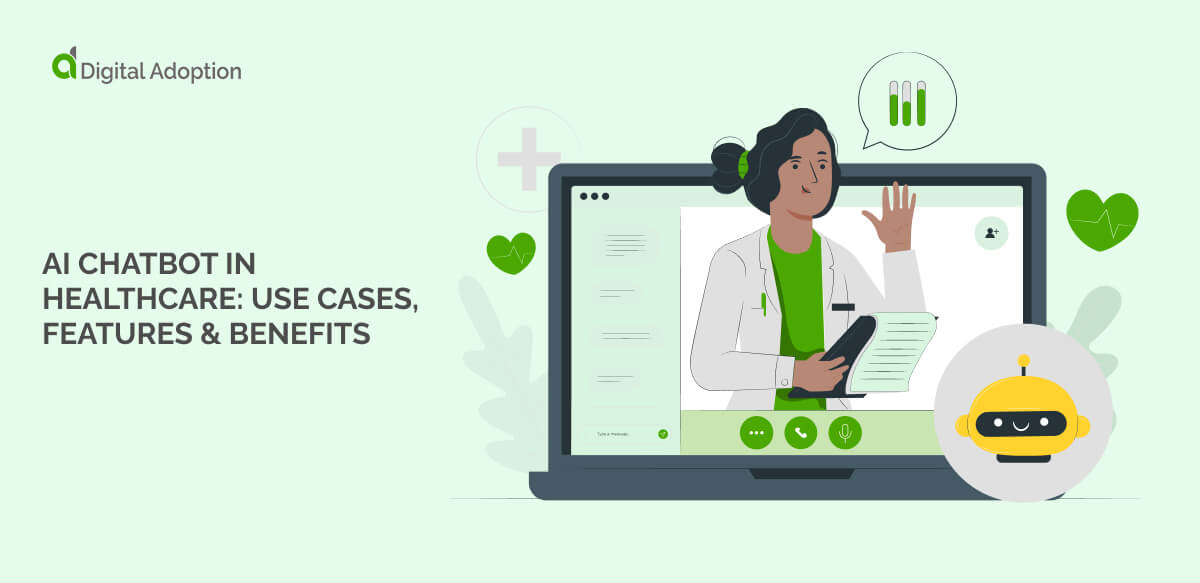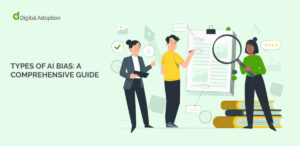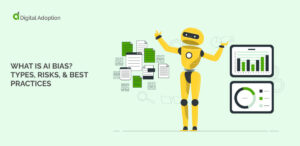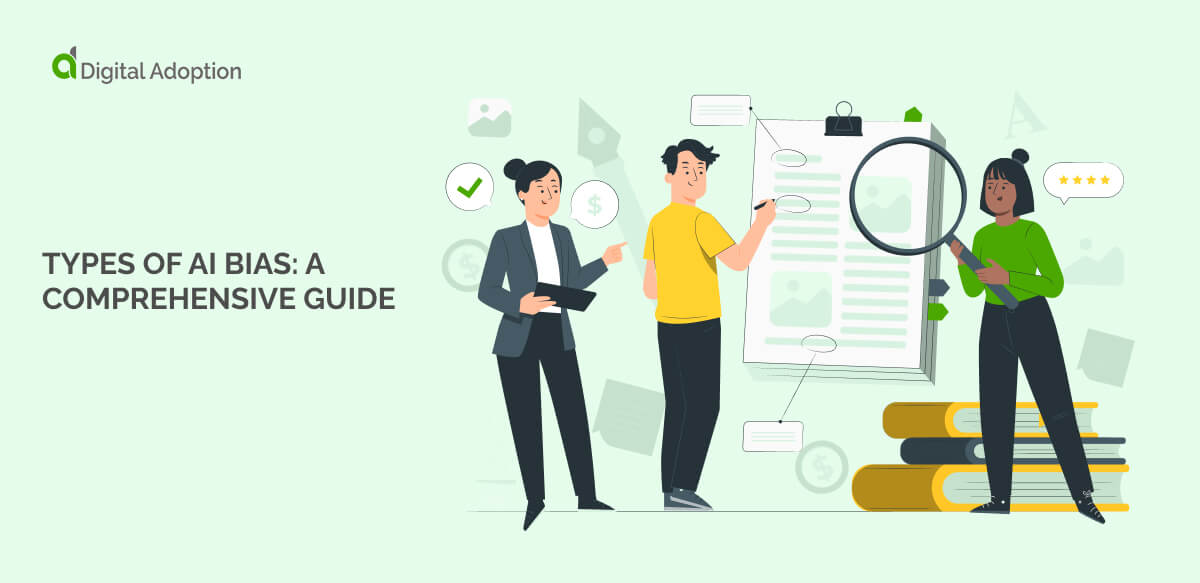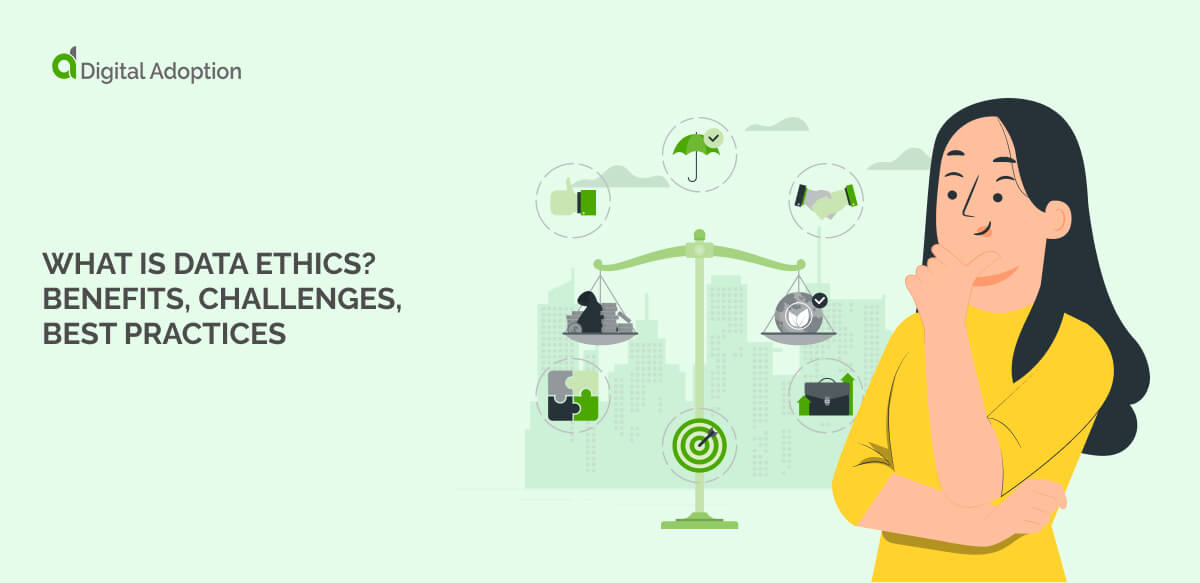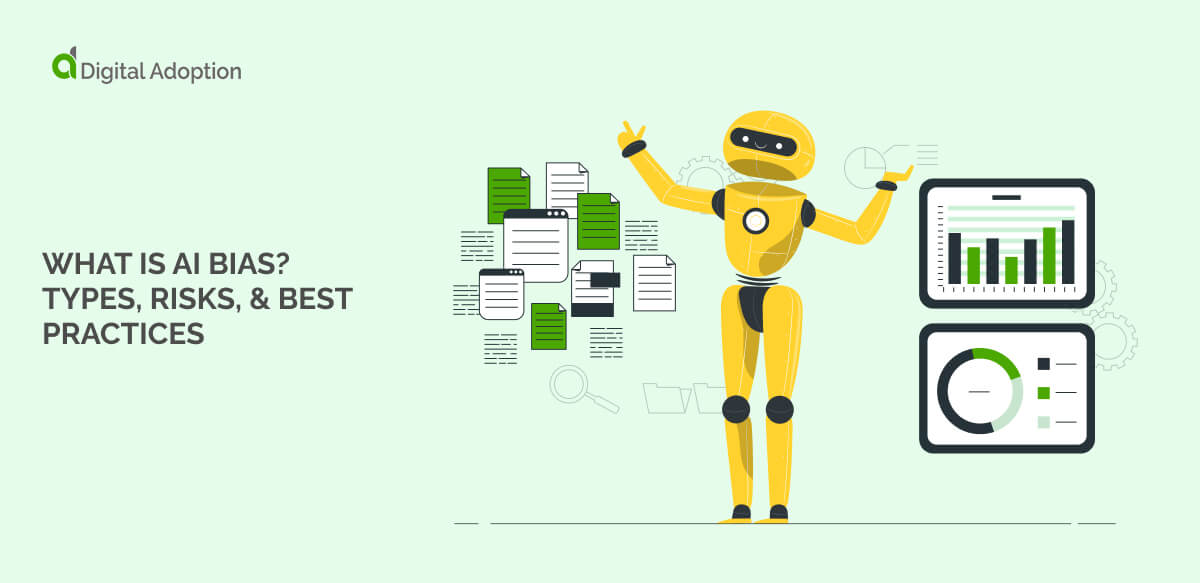Healthcare is embracing AI adoption to transform traditional processes.
AI’s value is undeniable, from automating patient care and administrative actions to supporting decision-making and recognizing hidden patterns in medical data.
AI chatbots, in particular, are helping to strengthen frontline support with solutions that remedy both patient-facing and back-office demands. These digital tools can augment key tasks, alleviating some of the day-to-day pressures of modern medical professionals.
This article will delve into AI chatbots for healthcare. We’ll explore the importance of their role, how they’re being used, and their essential functions. We’ll also explore how responsible implementation ensures that medical professionals can deliver quality patient experiences.
- What is an AI chatbot for healthcare?
- Why are AI chatbots for healthcare important?
- What features should an AI chatbot for healthcare include?
- AI chatbot use cases in healthcare
- What are the benefits of AI chatbots for healthcare?
- What are the challenges of AI chatbots for healthcare?
- How to effectively manage AI risks in healthcare
- People Also Ask
What is an AI chatbot for healthcare?
An AI chatbot for healthcare is a self-directed software or system designed to engage in natural conversation, perform tasks, and generate information on behalf of healthcare providers.
These conversational agents tap into medical data to learn, understand, and adapt to real-time changes. AI chatbots merge machine learning (ML), natural language processing (NLP), data processing, and other key technologies that underpin AI functions.
AI chatbots can provide 24/7 support, day and night, while also talking to multiple patients simultaneously. Natural language capabilities ensure these conversations are human-like and intuitive.
Some enterprise-level AI chatbots even leverage computer vision (CV). This enables AI bots to visualize and understand images and documents, such as verifying patient ID or detecting hidden patterns in medical images.
This availability heightens patient care by automating admin and manual actions. From patient onboarding, symptom diagnosis, appointment booking, and prescription requests, emergent AI capabilities are elevating healthcare experiences.
Why are AI chatbots for healthcare important?
Time spent completing back-office actions has taken a toll on healthcare workers, with employee burnout often the result.
A Google Cloud and Harris Poll report shows that U.S. clinicians lose nearly 28 hours per week to administrative tasks, leaving less time for patient care. As a result, 82% of clinicians report feeling burned out.
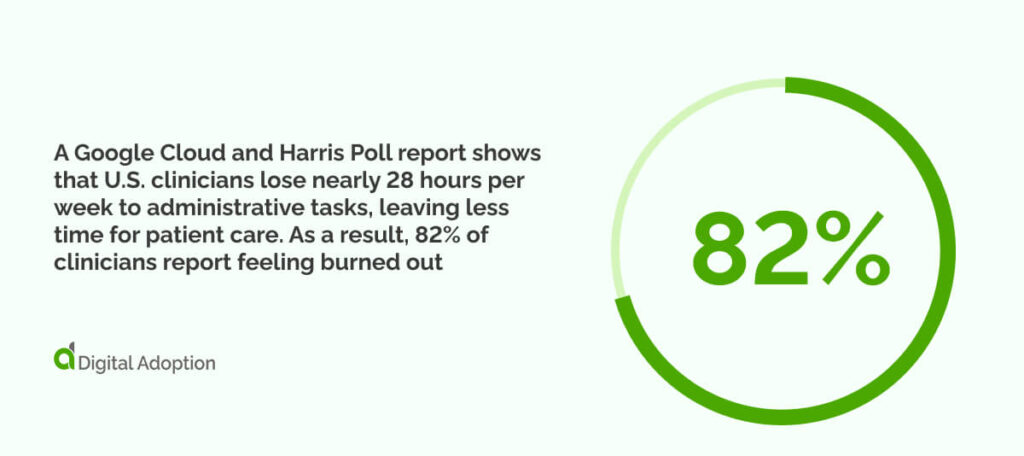
AI chatbots can bridge these gaps for healthcare providers, augmenting various tasks that save time and improve employee productivity. They can resolve patient queries, analyze medical data to make decisions, and connect patients with human agents should they need further help.
For general practitioners, doctors, nurses, and healthcare providers, AI chatbots present an opportunity to heighten service quality and patient experiences. This transformation in healthcare aligns perfectly with evolving patient expectations today, both of which increasingly seek gains in efficiency through digital solutions.
What features should an AI chatbot for healthcare include?
AI’s wide applicability makes it viable for almost every business across nearly every industry. Depending on the sector or pain point, solutions can be designed to complete highly specific actions.
However, in high-stakes sectors such as healthcare or finance, AI adoption comes with a few non-negotiables to remain risk-free. At the very least, AI in healthcare must be reliable, accurate, and compliant.
To operate, AI chatbots store vast amounts of sensitive personal data. They also provide medical advice that must be accurate and tailored to each patient’s needs.
Let’s look at some essential features AI chatbots in healthcare must have to deliver reliable, sustained solutions:
- Performance tracking: Track chatbot accuracy and response speed with trusted data to maintain reliable results.
- System standards: Ensure the platform follows healthcare rules for easy integration with medical systems.
- Custom options: Allow changes to settings based on different healthcare needs, like patient preferences.
- Simple navigation: Provide an easy-to-use interface that automatically answers questions for quick interactions.
- Secure compliance: Ensure the chatbot follows HIPAA rules to protect patient information.
AI chatbot use cases in healthcare
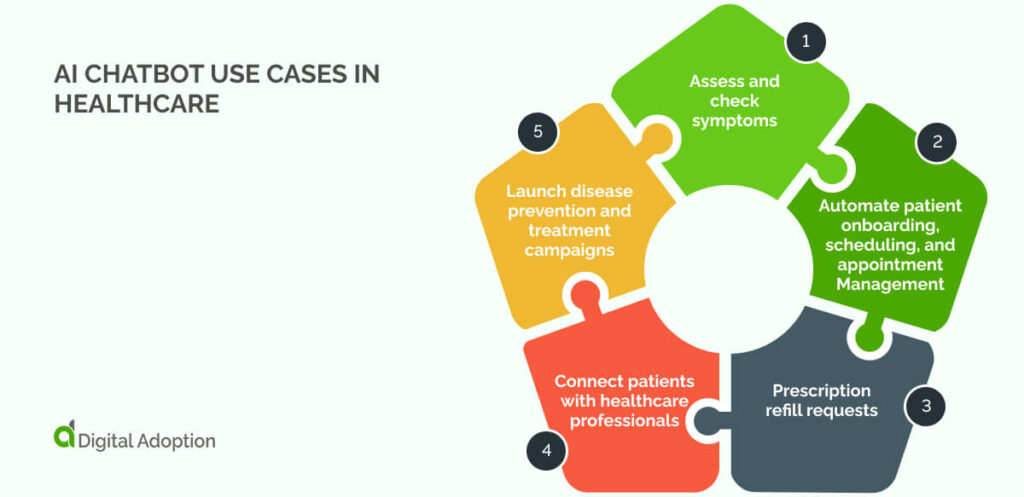
As healthcare organizations adopt more advanced digital tools, AI chatbots are becoming valuable assets in both clinical and administrative settings. Unlike earlier rule-based systems that provided scripted, limited responses, today’s AI chatbots use natural language processing and machine learning to understand, engage, and support patients and staff more effectively.
Modern AI chatbots help automate tasks, improve access to care, and streamline communication between patients and providers. Below are some of the top use cases being implemented across the healthcare sector:
Assess and check symptoms
AI chatbots can ask patients questions about their symptoms and then cross-reference the answers with a medical database to identify possible health issues. The agent will then suggest the next steps, such as recommending scheduling an appointment or seeking urgent care. This provides quick guidance and reduces unnecessary in-person visits to the doctor.
Automate patient onboarding, scheduling, and appointment Management
AI chatbots simplify the patient onboarding process and enhance E-health systems. Agents collect personal and medical information, reducing the need for physical documents. The chatbot can also schedule appointments and send reminders. If needed, it helps patients reschedule and easily access their appointment details, making the whole process faster and reducing the workload for staff.
Prescription refill requests
AI chatbots authorize prescription refills. Patients enter their medication details, and the chatbot verifies whether the prescription is ready for a refill. It then notifies the pharmacy and confirms with the patient. If necessary, the chatbot will suggest making an appointment. This fast-tracks the process and reduces the time spent waiting on the phone.
Connect patients with healthcare professionals.
AI chatbots can match patients with the appropriate healthcare professional based on their needs. If a patient requires a specialist, the chatbot facilitates this connection and can also help schedule virtual doctor visits. This ensures that patients receive timely care, even without visiting the office. AI agents can also answer follow-up questions and track interactions to stay updated.
Launch disease prevention and treatment campaigns.
AI chatbots assist in launching public health campaigns. They send messages to targeted groups, such as reminders for vaccines or check-ups, and educate patients on prevention steps and treatment options. The chatbot uses data to personalize messages for each patient, helping maintain consistent health awareness across local and broader communities.
What are the benefits of AI chatbots for healthcare?
A Mercer study projects a shortage of 100,000 critical healthcare workers in the U.S. by 2028.
AI chatbots in healthcare aim to alleviate pain points like these in various ways. This includes reducing costs from legacy software and human labor. It includes deploying self-service solutions that allow healthcare providers to delegate some of their tasks to trusted AI agents.
AI chatbots present a range of benefits to healthcare when implemented correctly. Let’s explore some of these:
- Accelerates query resolution: AI chatbots quickly answer patient questions, reducing wait times and providing faster access to information.
- Mitigates costs: AI chatbots handle routine inquiries, allowing healthcare staff to focus on more complex tasks and reducing labor costs.
- Provides patient anonymity: Chatbots allow patients to seek advice or ask questions without revealing personal details, ensuring privacy.
- Automates self-service capabilities: Patients can schedule appointments, refill prescriptions, and access medical records independently, reducing the need for human intervention.
What are the challenges of AI chatbots for healthcare?
When AI chatbots are implemented incorrectly, they can lead to a host of issues, some of which may be irreversible. That’s why proper AI adoption in healthcare must be incremental and responsible.
Let’s explore some challenges and concerns AI could pose in healthcare:
- Simple queries only: AI chatbots work best with simple questions but may have trouble answering complicated medical issues.
- AI hallucinations and bias: Chatbots can sometimes give wrong or biased answers, which could lead to confusion or mistakes in healthcare.
- Privacy concerns: Patients might worry about their health data being shared or hacked when talking to chatbots.
How to effectively manage AI risks in healthcare
Safe AI use in healthcare is crucial as its potential continues to grow. To manage AI risks, encrypt patient data and regularly test AI systems to catch errors early.
Set clear guidelines for AI behavior, especially when offering medical advice. Involve healthcare professionals in the development process to reduce mistakes and biases. AI should be continuously trained to improve accuracy and fairness.
When done right, AI can enhance patient care, augment actions, and fast-track efficiency. Regular oversight and evaluation are key to maintaining trust, ensuring data privacy, and keeping healthcare systems safe and effective.
People Also Ask
-
How can AI be used in healthcare?AI in healthcare can analyze medical data, predict health outcomes, and assist with diagnosis. It can help doctors by offering insights from patient records, imaging, and lab results. AI scheduling assistants can book appointments and manage administrative tasks, making the system more efficient.
-
What is the best AI chatbot for medical diagnosis?The best AI chatbot for medical diagnosis depends on the type of service needed. Some popular options include IBM Watson Health and Babylon Health, designed to help users understand symptoms and suggest possible conditions. These tools use large databases of medical knowledge to give accurate results.

